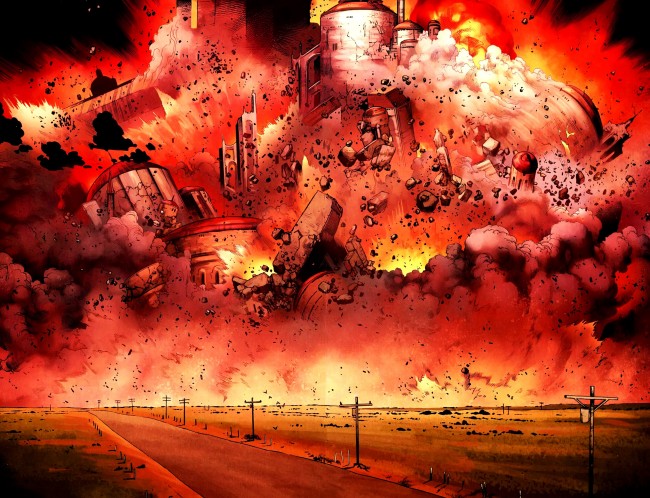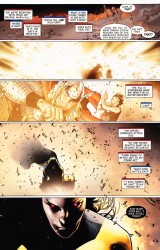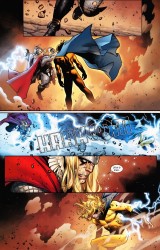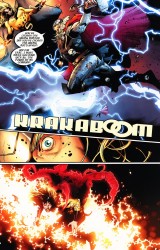
Uncanny Avengers, X-Men, Rick Remender, and Oppression Comix
March 29th, 2013 Posted by david brothersHere’s an image from the latest issue of Uncanny Avengers 5, drawn by Olivier Coipel, inked by Mark Morales, written by Rick Remender, and colored by either Laura Martin, Larry Molinar, or both:

I saw this excerpted on The Beat and I thought it was pretty funny. I disagree with what Alex is saying, but lots of comics characters say things I disagree with, and I’m not reading this comic anyway, so that’s a double dose of “who cares.” But I’ve also seen similar sentiments expressed elsewhere — by actual, non-fictional people, I mean, not other cartoon characters — and that always secretly bugs me, so whoops I do care a whole lot and my jaded exterior is a false face.
I have two problems with this, but they come more from a theoretical perspective than a “I don’t like this story” perspective. For the phrase “the m-word” to be viable as a concept, Alex’s speech can’t be about “mutant,” which has been the accepted way to refer to the X-Men for basically ever. Professor X does it, Magneto does it, and I figure basically every X-writer has approached it as a neutral way to refer to m-words nine times out of ten. It has been used in negative ways, but so have the pretty much neutral words black, Jew, gay, and probably everything else. The offensive part of “black bastard” isn’t “black.” It’s “bastard.”
Alex’s speech, to make the metaphor work, has to be about “mutie,” which is about as close as mutant-oriented slurs get to “nigger.” Alex’s speech is the equivalent of a black dude saying “Don’t call me black,” which is a thing that definitely gets expressed that I don’t think holds up under scrutiny at all. It prizes blind assimilation over actual acceptance. It’s not “I’m just like you” so much as “I’m just like you because I don’t mention this part where we’re different that makes you uncomfortable.”
(Yes, I’ve seen the Morgan Freeman video, people who are rushing to post it in the comments as some type of counterpoint. “Stop talking about it” is the stupidest advice anyone ever gave for solving any problem in the entire world. Nothing fixes itself.)
Luckily that’s my other point: this is naive in a way that I appreciate (honest!) but will never, ever believe in. I get what Alex is saying, but it also depends on the entire world magically changing their points of view to one that doesn’t view you as a threat. It’ll work on some people, especially if you’re a pretty mutant, but it will have less than zero effect on everyone else. “Don’t look at me like a black guy,” said the black guy who somehow forgot that racism is a system that doesn’t magically go away if you personally ignore our differences. There are years — centuries in real life, decades in comic books — of momentum that don’t just stop because you make a semantic change. This is the opposite of realpolitik. It’s tumblrpolitik. As far as workable philosophies go, it makes a nice image macro or touching edit of A Softer World.
But! Who cares? I’ve disagreed with stuff in comics before, and in X-Men comics in particular, pretty much ever since I first saw one of those idiotic “Professor X is Martin Luther King and Magneto is Malcolm X!” comparisons. (They aren’t, not even close, and you can’t support that position without being real ignorant of like… anything about everyone involved.) I’ll somehow limp along and live my life without holding a grudge over Alex “Havok” Summers believing something different from me in a comic book I ain’t reading.
BUT! I do think doing this sort of story with the X-Men is a mistake. The X-Men are, in the eyes of both Marvel and the vast majority of fans, an oppression metaphor. Mutants-as-blacks, mutants-as-gays, mutants-as-outcasts. You can fill in the blank with your preferred marginalized group, up to and including white dudes. It’s a tremendous asset to the franchise, because everyone feels alone and like an outcast sometimes. The X-Men are feared and hated by a world they are sworn to protect, which sets them up as underdogs.
BUT!!! This is an example of the franchise flying too close to the sun and getting too specific, which is usually a mistake. The metaphor has worked for so long because it’s amazingly broad and they rarely ever address the actual factual parts of being marginalized within the text. The X-Men franchise is a soap opera about pretty people having sex and fighting evil and sometimes disfigured bad guys, but somehow they’re still underdogs and we love them for it. They’ll borrow specific things here and there, but fictionalize them to the point that they have a taste of real life, rather than a full bite.
There are a few good and recent examples of the franchise going specific. The Fraction/Land run on Uncanny X-Men had an anti-mutant take on Prop 8 I think, and I’m pretty sure that Bendis is mining black nationalist language and tactics for his take on Cyclops but don’t know for certain. Peter David and Larry Stroman kinda explored this years ago in X-Factor with the term “genetically-challenged,” which used humor to kill the tension and keep you into it.
Nailing this kind of specificity is a tough row to hoe, and if you tilt too far toward realism — toward acknowledging the actual oppression that provides fodder for X-Men stories — the balance gets entirely upset. In this case, “the m-word” is clearly, clearly, trading on “the n-word,” a censored version of the word “nigger.” That pulls Alex’s argument from being the kind of pie-in-the-sky optimism that is common to the franchise (my favorite example is Professor X’s speech during X-Cutioner’s Song, I think) to something that we look at with real world eyes. It reminds us that people still get called niggers for no reason at all, and that makes the metaphor that’s central to the X-Men seem cheap.
So in as much as I am upset with or at this scene, my problem is basically that, as a dude who is familiar with the X-Men and aware of how race is treated in my culture, I can’t buy it. It doesn’t work from a marginalized perspective, and it doesn’t necessarily do the X-Men franchise any favors, either. That’s a suspension of disbelief thing, so it ain’t a big deal. I though this was funny, tweeted about it, read other people talking about it, and then I saw this:
Heads up– If Havok’s position in UA #5 really upset you, it’s time to drown yourself hobo piss. Seriously, do it. It’s the only solution.
— Rick Remender (@Remender) March 28, 2013
“Didn’t you know Alex Summers once said something in issue 3845 of X-Factor that totally contradicts this?! Didn’t you?!” –Joyless Goober
— Rick Remender (@Remender) March 28, 2013
Which is kind of a bummer, and by kind of a bummer, I mean ughhhhhhhh. It’s a dumb response when “sorry it didn’t work for you, I hope you stick around” or dead silence will do. (“Kill yourself” in any form is a pretty bad look in a situation like this.) That was when I realized that this was a whole thing already, and I thought about tweeting Remender about it, but I’m blocked for whatever reason (I honestly don’t know why) so I didn’t.
While talking to Joe Hughes, my editor at ComicsAlliance and fellow Black Dude In Comics, Remender said that the story/scene “has nothing to do with black people. It’s about imaginary mutants.” and that “the n-word doesn’t own the concept.” Which is crazy. I mean, kids still do the s-word, b-word, d-word thing, but adults? In 2013? About an X-Men comic? You can’t tell me that “the n-word” has no influence on “the m-word.” That’s crazy. That’s like… I can’t even think of a good comparison. “The m-word” is related to “the n-word” because it’s a euphemism for a hurtful word introduced with the idea of decreasing the power of the original word. Arguing that it isn’t related at all requires some pretty amazing mental gymnastics. And if you honestly believe there’s no relation between the two… I don’t know, dude. I don’t have any jokes or anything to soften the blow — this is like ground level stuff.
Later, Jason Aaron sent these perfectly reasonable messages (among others) as a way of defending Remender:
@joehughes28 Even now, I think there’s a lot about the X-Men mythos that doesn’t match up with a race or minority metaphor.
— Jason Aaron (@jasonaaron) March 28, 2013
@joehughes28 I just don’t think you can look at everything that relates to the X-Men through the lens of one metaphor.
— Jason Aaron (@jasonaaron) March 29, 2013
Which is true! It doesn’t match up all the time. But what I think is very relevant here is that the X-Men are a lot of things to a lot of people, but one of the most important things they are — I’m talking top two, right after “sexy people with cool powers” — is an oppression metaphor. You cannot escape this. It is built into the X-Men’s DNA. It wasn’t there at the beginning, but by the time Claremont got through with them? It was in there. It’s indelible, like Gwen Stacy for Spidey or Batman not murdering dudes. The oppression metaphor is a vital piece of the engine that makes the X-Men work.
It’s part of the incredible tapestry that is the X-Men, and it’s a big part, so you can’t really blame people for looking at it through that lens by default. And you especially can’t blame them for doing it in a story that specifically invokes that metaphor. I understand that the X-Men are a lot of things, but going by this page, the oppression metaphor is explicitly invoked. So of course people are going to look at it through the lens of real life oppression. It’s childish but… “he started it” is pretty apt here.
This isn’t even some kind of tough guy “if you can’t handle the heat, get out of the kitchen” thing. Remender cranked the heat up, put a quart of water on to boil, walked away, and came back like “Wow this boiling water should totally go drown itself in hobo piss, who does this water think it is?”
My biggest problem with this is Remender’s response. Scott Summers’s weird brother saying things is pretty immaterial to me, except as a way to start a conversation. But telling people who are participating in a discussion that you invited to drown in hobo piss is aggravating. It’s contemptuous. This guy is writing Oppression Comix and when questioned on a fine point, he goes to “kill yourself?” And obviously it’s metaphorical and he doesn’t think dissenters should actually kill themselves, but if I led this piece with “if all these straight white dudes keep acting out and then telling me how offended I get to be over something they did I swear I’ma hit somebody with a hammer, whoo lawdy this racism is killing me inside” you’d probably get upset at me, and with good reason.
I’m sure the usual gang of idiots crawled up his butt with idiotic harassment, but cripes dude maybe there is a better way to handle that than blanket-shaming everyone who doesn’t agree with you. It’s not hard to not be a dick. Ignore the trolls. Talk to the people with actual concerns. Ignore the people with actual concerns. Deflect. Pretend like nothing is going on. Do anything but sit there and tell a bunch of people who are dead in the center of the X-Men target audience and whose day-to-day life often provides fodder for X-Men stories to shut their yaps because mutants aren’t actually black/gay/whatever and your story has absolutely no basis in real life, even though your story is quoting an actual real life argument.
Instead:
Here’s NOFX dropping science for all you pious finger waggers DON’T CALL ME WHITE –youtu.be/4BgHq5jGfoE
— Rick Remender (@Remender) March 29, 2013
which I guess is some kind of sarcastic ironic supergenius double bluff I’m not smart enough to get or something, because it just looks another stupid and tone deaf message after a day full of them from where I’m sitting here on my ivory throne. Besides, that finger of mine that’s wagging? At this point, it’s far from the pious one, hoss.




